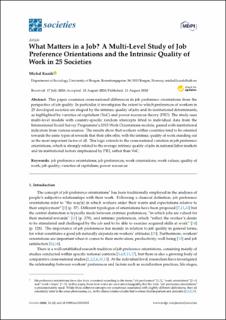| dc.contributor.author | Kozák, Michal | |
| dc.date.accessioned | 2021-04-29T13:02:42Z | |
| dc.date.available | 2021-04-29T13:02:42Z | |
| dc.date.created | 2020-11-18T15:06:42Z | |
| dc.date.issued | 2020 | |
| dc.identifier.issn | 2075-4698 | |
| dc.identifier.uri | https://hdl.handle.net/11250/2740417 | |
| dc.description.abstract | This paper examines cross-national differences in job preference orientations from the perspective of job quality. In particular, it investigates the extent to which preferences of workers in 25 developed societies are shaped by the intrinsic quality of jobs and its institutional determinants, as highlighted by varieties of capitalism (VoC) and power resources theory (PRT). The study uses multi-level models with country-specific random intercepts fitted to individual data from the International Social Survey Programme’s 2015 Work Orientations module, paired with institutional indicators from various sources. The results show that workers within countries tend to be oriented towards the same types of rewards that their jobs offer, with the intrinsic quality of work standing out as the most important factor of all. This logic extends to the cross-national variation in job preference orientations, which is strongly related to the average intrinsic quality of jobs in national labor markets and its institutional factors emphasized by PRT, rather than VoC. | en_US |
| dc.language.iso | eng | en_US |
| dc.publisher | MDPI | en_US |
| dc.rights | Navngivelse 4.0 Internasjonal | * |
| dc.rights.uri | http://creativecommons.org/licenses/by/4.0/deed.no | * |
| dc.title | What Matters in a Job? A Multi-Level Study of Job Preference Orientations and the Intrinsic Quality of Work in 25 Societies | en_US |
| dc.type | Journal article | en_US |
| dc.type | Peer reviewed | en_US |
| dc.description.version | publishedVersion | en_US |
| dc.rights.holder | Copyright 2020 by the author. | en_US |
| dc.source.articlenumber | 62 | en_US |
| cristin.ispublished | true | |
| cristin.fulltext | original | |
| cristin.qualitycode | 1 | |
| dc.identifier.doi | 10.3390/soc10030062 | |
| dc.identifier.cristin | 1849351 | |
| dc.source.journal | Societies | en_US |
| dc.source.40 | 10 | |
| dc.source.14 | 3 | |
| dc.identifier.citation | Societies. 2020, 10 (3), 62. | en_US |
| dc.source.volume | 10 | en_US |
| dc.source.issue | 3 | en_US |

